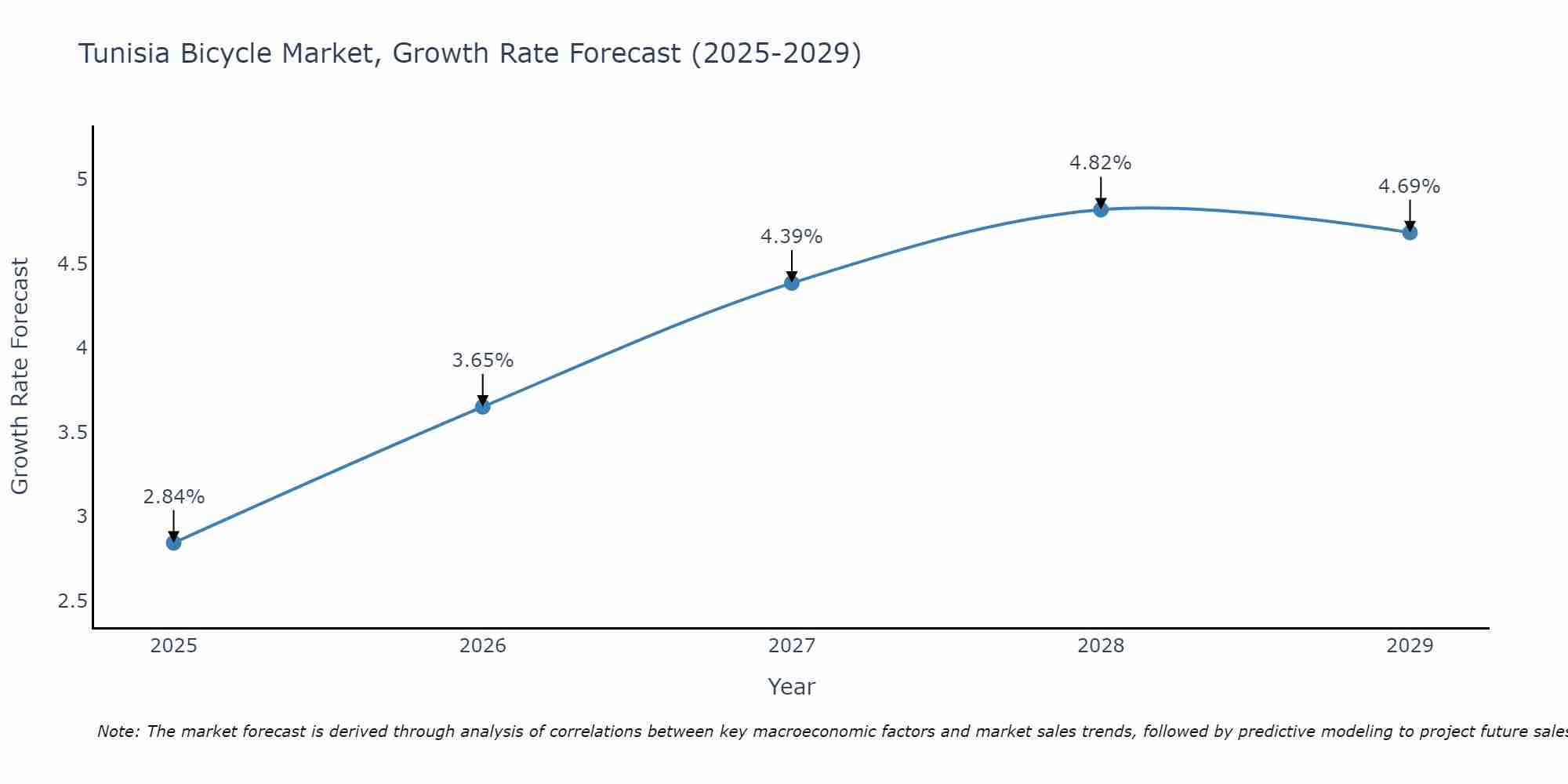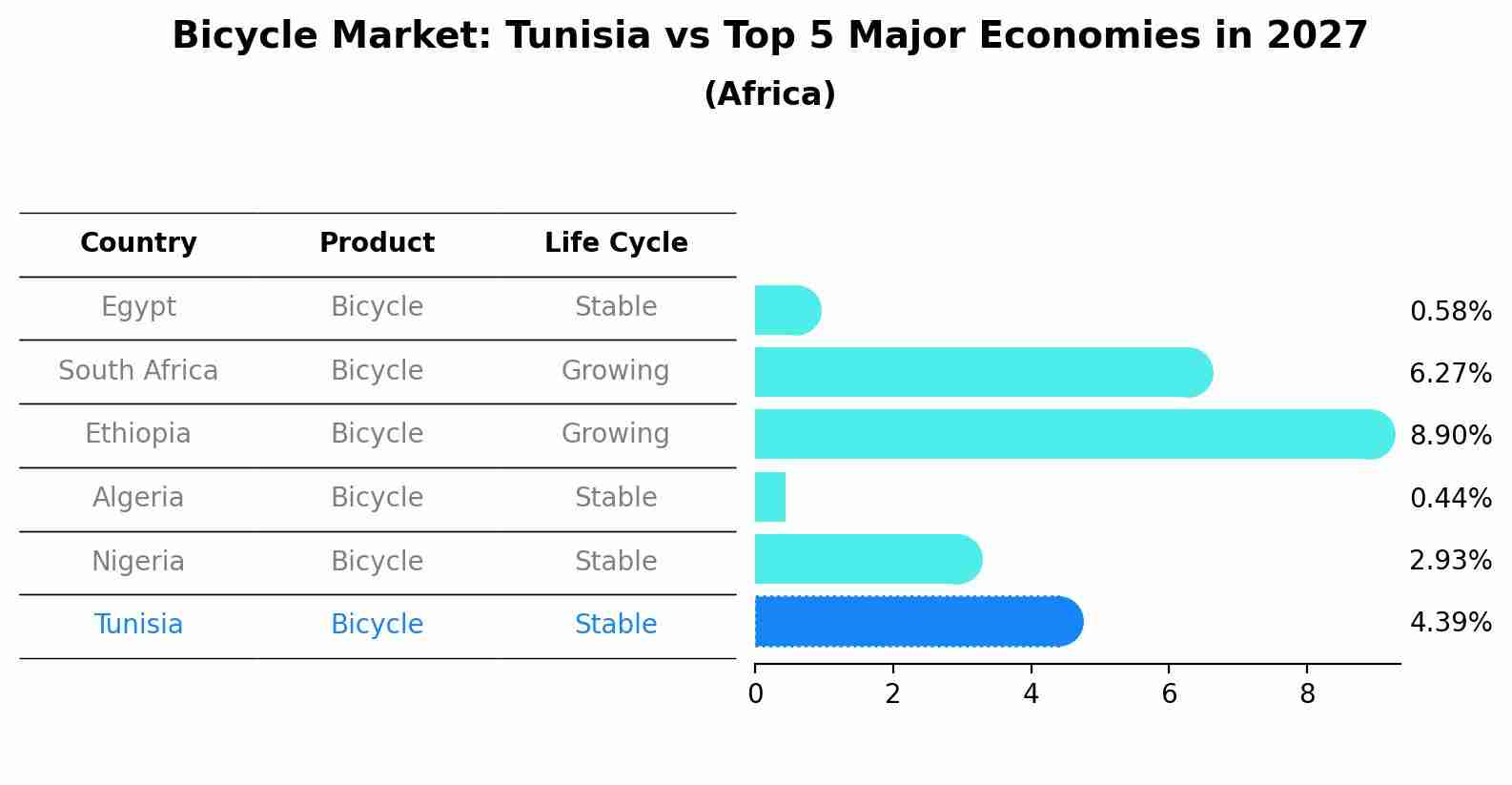Tunisia Bicycle Market Outlook | Share, Growth, Analysis, Size, Value, Revenue, Companies, Forecast, Industry, Trends & COVID-19 IMPACT
| Product Code: ETC362154 | Publication Date: Aug 2022 | Updated Date: Aug 2025 | Product Type: Market Research Report | |
| Publisher: 6Wresearch | Author: Bhawna Singh | No. of Pages: 75 | No. of Figures: 35 | No. of Tables: 20 |
Tunisia Bicycle Market Size Growth Rate
The Tunisia Bicycle Market is projected to witness mixed growth rate patterns during 2025 to 2029. Starting at 2.84% in 2025, the market peaks at 4.82% in 2028, and settles at 4.69% by 2029.

Bicycle Market: Tunisia vs Top 5 Major Economies in 2027 (Africa)
The Bicycle market in Tunisia is projected to grow at a stable growth rate of 4.39% by 2027, highlighting the country's increasing focus on advanced technologies within the Africa region, where Egypt holds the dominant position, followed closely by South Africa, Ethiopia, Algeria and Nigeria, shaping overall regional demand.

Tunisia Bicycle Market Synopsis
The Tunisia bicycle market has been experiencing steady growth in recent years, driven by factors such as increasing health consciousness, environmental awareness, and a growing interest in recreational activities. The market offers a variety of bicycles catering to different segments, including mountain bikes, road bikes, and electric bikes. Local manufacturers and international brands compete in the market, offering a range of options in terms of price, quality, and features. Urban areas see a higher demand for commuter and hybrid bikes, while rural areas show interest in mountain bikes for off-road adventures. Government initiatives promoting cycling infrastructure and events further support the growth of the bicycle market in Tunisia. Overall, the market presents opportunities for both domestic and international players to capitalize on the growing demand for bicycles in the country.
Tunisia Bicycle Market Trends
The Tunisia Bicycle Market is experiencing several key trends. Firstly, there is a growing interest in eco-friendly transportation options, leading to an increased demand for bicycles as a sustainable mode of transport. Secondly, the rise of health and wellness awareness among Tunisians has boosted the popularity of cycling as a form of exercise and recreation. Additionally, the government`s initiatives to promote cycling infrastructure and bike-sharing programs in major cities are further driving the market growth. E-bikes are also gaining traction in Tunisia, offering a convenient and efficient alternative for commuters. Overall, the Tunisia Bicycle Market is witnessing a shift towards sustainable mobility solutions, health-conscious lifestyles, and increased government support for cycling initiatives.
Tunisia Bicycle Market Challenges
In the Tunisia Bicycle Market, challenges mainly stem from economic factors such as high import tariffs on bicycles and related components, making them relatively expensive for consumers. Additionally, a lack of dedicated cycling infrastructure and safety measures poses a barrier to the market`s growth, as potential customers may perceive cycling as risky or inconvenient. Limited awareness and promotion of cycling as a sustainable and healthy transportation option further hinder market penetration. Moreover, the dominance of motorized vehicles and the cultural preference for cars as status symbols present challenges in shifting towards a more bicycle-friendly society. Overcoming these obstacles would require a multi-faceted approach involving government support, infrastructure development, public awareness campaigns, and efforts to change societal attitudes towards cycling.
Tunisia Bicycle Market Investment Opportunities
The Tunisia Bicycle Market presents several investment opportunities due to increasing interest in cycling for both transportation and recreation. Potential areas for investment include the manufacturing and distribution of bicycles to meet the growing demand, as well as the development of cycling infrastructure such as bike lanes, rental services, and organized cycling events to promote the sport. Additionally, there is potential for investment in eco-friendly and sustainable bicycle designs to cater to the environmentally conscious consumer base. Partnering with local cycling clubs and organizations could also provide opportunities for sponsorships and collaborations to further boost market presence. Overall, the Tunisia Bicycle Market offers various avenues for investment to capitalize on the rising popularity of cycling in the region.
Jordan Agar Market Government Policies
The Tunisian government has been supportive of promoting sustainable transportation options, including bicycles, to reduce traffic congestion and improve air quality. In recent years, the government has implemented policies such as investing in cycling infrastructure, creating bike lanes in urban areas, and launching public bike-sharing programs in cities like Tunis. Additionally, there have been initiatives to provide subsidies or tax incentives for the purchase of bicycles and to promote cycling as a means of reducing carbon emissions and promoting physical activity. Moving forward, the government aims to further develop and expand the bicycle market in Tunisia through continued investment in infrastructure and awareness campaigns to encourage more people to choose cycling as a mode of transportation.
Tunisia Bicycle Market Future Outlook
The future outlook for the Tunisia Bicycle Market appears positive, driven by several factors. With a growing awareness of health and environmental benefits, there is an increasing demand for sustainable transportation options, including bicycles. Government initiatives promoting cycling infrastructure and the implementation of bike-sharing programs further support market growth. Additionally, the rise of cycling as a recreational activity and a mode of urban commuting among the younger population is expected to drive sales in the coming years. As disposable incomes increase and urbanization continues, the demand for bicycles is likely to rise, presenting opportunities for manufacturers and retailers to expand their offerings and cater to a diverse range of consumer preferences in the Tunisian market.
Key Highlights of the Report:
- Tunisia Bicycle Market Outlook
- Market Size of Tunisia Bicycle Market, 2021
- Forecast of Tunisia Bicycle Market, 2031
- Historical Data and Forecast of Tunisia Bicycle Revenues & Volume for the Period 2018 - 2031
- Tunisia Bicycle Market Trend Evolution
- Tunisia Bicycle Market Drivers and Challenges
- Tunisia Bicycle Price Trends
- Tunisia Bicycle Porter's Five Forces
- Tunisia Bicycle Industry Life Cycle
- Historical Data and Forecast of Tunisia Bicycle Market Revenues & Volume By Product for the Period 2018 - 2031
- Historical Data and Forecast of Tunisia Bicycle Market Revenues & Volume By Mountain Bikes for the Period 2018 - 2031
- Historical Data and Forecast of Tunisia Bicycle Market Revenues & Volume By Hybrid Bikes for the Period 2018 - 2031
- Historical Data and Forecast of Tunisia Bicycle Market Revenues & Volume By Road Bikes for the Period 2018 - 2031
- Historical Data and Forecast of Tunisia Bicycle Market Revenues & Volume By Cargo Bikes for the Period 2018 - 2031
- Historical Data and Forecast of Tunisia Bicycle Market Revenues & Volume By Others for the Period 2018 - 2031
- Historical Data and Forecast of Tunisia Bicycle Market Revenues & Volume By Technology for the Period 2018 - 2031
- Historical Data and Forecast of Tunisia Bicycle Market Revenues & Volume By Electric for the Period 2018 - 2031
- Historical Data and Forecast of Tunisia Bicycle Market Revenues & Volume By Conventional for the Period 2018 - 2031
- Historical Data and Forecast of Tunisia Bicycle Market Revenues & Volume By End-user for the Period 2018 - 2031
- Historical Data and Forecast of Tunisia Bicycle Market Revenues & Volume By Men for the Period 2018 - 2031
- Historical Data and Forecast of Tunisia Bicycle Market Revenues & Volume By Women for the Period 2018 - 2031
- Historical Data and Forecast of Tunisia Bicycle Market Revenues & Volume By Kids for the Period 2018 - 2031
- Historical Data and Forecast of Tunisia Bicycle Market Revenues & Volume By Distribution Channel for the Period 2018 - 2031
- Historical Data and Forecast of Tunisia Bicycle Market Revenues & Volume By Online for the Period 2018 - 2031
- Historical Data and Forecast of Tunisia Bicycle Market Revenues & Volume By Offline for the Period 2018 - 2031
- Tunisia Bicycle Import Export Trade Statistics
- Market Opportunity Assessment By Product
- Market Opportunity Assessment By Technology
- Market Opportunity Assessment By End-user
- Market Opportunity Assessment By Distribution Channel
- Tunisia Bicycle Top Companies Market Share
- Tunisia Bicycle Competitive Benchmarking By Technical and Operational Parameters
- Tunisia Bicycle Company Profiles
- Tunisia Bicycle Key Strategic Recommendations
Frequently Asked Questions About the Market Study (FAQs):
- Single User License$ 1,995
- Department License$ 2,400
- Site License$ 3,120
- Global License$ 3,795
Search
Thought Leadership and Analyst Meet
Our Clients
Related Reports
- Germany Breakfast Food Market (2026-2032) | Industry, Share, Growth, Size, Companies, Value, Analysis, Revenue, Trends, Forecast & Outlook
- Australia Briquette Market (2025-2031) | Growth, Size, Revenue, Forecast, Analysis, Trends, Value, Share, Industry & Companies
- Vietnam System Integrator Market (2025-2031) | Size, Companies, Analysis, Industry, Value, Forecast, Growth, Trends, Revenue & Share
- ASEAN and Thailand Brain Health Supplements Market (2025-2031) | Strategy, Consumer Insights, Analysis, Investment Trends, Opportunities, Growth, Size, Share, Industry, Revenue, Segments, Value, Segmentation, Supply, Forecast, Restraints, Outlook, Competition, Drivers, Trends, Demand, Pricing Analysis, Competitive, Strategic Insights, Companies, Challenges
- ASEAN Bearings Market (2025-2031) | Strategy, Consumer Insights, Analysis, Investment Trends, Opportunities, Growth, Size, Share, Industry, Revenue, Segments, Value, Segmentation, Supply, Forecast, Restraints, Outlook, Competition, Drivers, Trends, Demand, Pricing Analysis, Competitive, Strategic Insights, Companies, Challenges
- Europe Flooring Market (2025-2031) | Outlook, Share, Industry, Trends, Forecast, Companies, Revenue, Size, Analysis, Growth & Value
- Saudi Arabia Manlift Market (2025-2031) | Outlook, Size, Growth, Trends, Companies, Industry, Revenue, Value, Share, Forecast & Analysis
- Uganda Excavator, Crane, and Wheel Loaders Market (2025-2031) | Strategy, Consumer Insights, Analysis, Investment Trends, Opportunities, Growth, Size, Share, Industry, Revenue, Segments, Value, Segmentation, Supply, Forecast, Restraints, Outlook, Competition, Drivers, Trends, Demand, Pricing Analysis, Competitive, Strategic Insights, Companies, Challenges
- Rwanda Excavator, Crane, and Wheel Loaders Market (2025-2031) | Strategy, Consumer Insights, Analysis, Investment Trends, Opportunities, Growth, Size, Share, Industry, Revenue, Segments, Value, Segmentation, Supply, Forecast, Restraints, Outlook, Competition, Drivers, Trends, Demand, Pricing Analysis, Competitive, Strategic Insights, Companies, Challenges
- Kenya Excavator, Crane, and Wheel Loaders Market (2025-2031) | Strategy, Consumer Insights, Analysis, Investment Trends, Opportunities, Growth, Size, Share, Industry, Revenue, Segments, Value, Segmentation, Supply, Forecast, Restraints, Outlook, Competition, Drivers, Trends, Demand, Pricing Analysis, Competitive, Strategic Insights, Companies, Challenges
Industry Events and Analyst Meet
Whitepaper
- Middle East & Africa Commercial Security Market Click here to view more.
- Middle East & Africa Fire Safety Systems & Equipment Market Click here to view more.
- GCC Drone Market Click here to view more.
- Middle East Lighting Fixture Market Click here to view more.
- GCC Physical & Perimeter Security Market Click here to view more.
6WResearch In News
- Doha a strategic location for EV manufacturing hub: IPA Qatar
- Demand for luxury TVs surging in the GCC, says Samsung
- Empowering Growth: The Thriving Journey of Bangladesh’s Cable Industry
- Demand for luxury TVs surging in the GCC, says Samsung
- Video call with a traditional healer? Once unthinkable, it’s now common in South Africa
- Intelligent Buildings To Smooth GCC’s Path To Net Zero


















